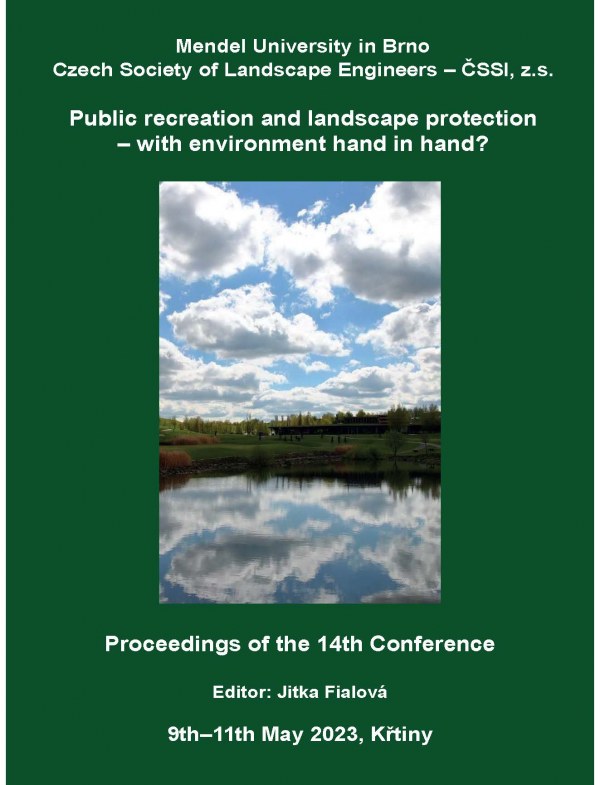
DOI: 10.11118/978-80-7509-904-4-0079
HEALTH VALUES OF FORESTS IN THE OPINION OF POLISH RESIDENTS
- Emilia Janeczko, Małgorzata Woźnicka
Scientific evidence pointing to the therapeutic, health functions of forests has been growing recently. It has already been repeatedly proven that visits to nature contribute to the restoration and preservation of people's mental health, as well as stress reduction. With the growing scientific evidence of the therapeutic properties of the natural environment, the importance of the forest in promoting public health is increasing. Public awareness of the health-promoting importance of forests is also growing. The results of our research show that people are aware of the importance of forests for their health, noting that these benefits fall into both physical, mental and social well-being categories.
Keywords: human well-being, health benefits, forest ecosystem services, social preferences
pages: 79-82, Published: 2023, online: 2023
References
- Bielinis, E., Jaroszewska, A., Łukowski, A., Takayama, N. (2020). The Effects of a Forest Therapy Programme on Mental Hospital Patients with Affective and Psychotic Disorders. Int. J. Environ. Res. Public Health, 17, 118.
 Go to original source...
Go to original source... - Bowler, D. E., Buyung-Ali, L. M., Knight, T. M., Pullin, A. S. (2010). A systematic review of evidence for the added benefits to health of exposure to natural environments. BMC Public Health, 10, 456.
 Go to original source...
Go to original source... - Han, J.-W., Choi, H., Jeon, Y.-H., Woo, J.-M., Kim, W. (2016). The Effects of Forest Therapy on Coping with Chronic Widespread Pain: Physiological and Psychological Differences between Participants in a Forest Therapy Program and a Control Group.nt. J. Environ. Res. Public Health, 13, 255.
 Go to original source...
Go to original source... - Hartig, T., Mitchell, R., De Vries, S., Frumkin, H. (2014). Nature and Health. Annual Review of Public Health, 35, 207-228.
 Go to original source...
Go to original source... - Janeczko, E., Bielinis, E., Wójcik, R., Woźnicka, M., Kędziora, W., Łukowski, A. Elsadek, M., Szyc, K., Janeczko, K. (2020). When Urban Environment Is Restorative: The Effect of Walking in Suburbs and Forests on Psychological and Physiological Relaxation of Young Polish Adults. Forests, 11, 591.
 Go to original source...
Go to original source... - Janeczko, E., Wójcik, R., Kędziora, W., Janeczko, K., Woźnicka, M. (2019). Organised physical activity in the forests of the Warsaw and Tricity ggglomerations, Poland. Int. J. Environ. Res. Public Health, 16, 3961.
 Go to original source...
Go to original source... - Jung, W. H., Woo, J. M., Ryu, J. S. (2015). Effect of a forest therapy program and the forest environment on female workers' stress. Urban For. Urban Green., 14, 274-281.
 Go to original source...
Go to original source... - Korpela, K., Ylén, M., Tyrväinen, L., Silvennoinen, H. (2008). Determinants of restorative experiences in everyday favourite places. Health Place,, 14, 636-652.
 Go to original source...
Go to original source... - Łobożewicz, T. (2000). Turystyka i rekreacja ludzi niepełnosprawnych. Wyższa Szkoła Ekonomiczna. Warszawa.
- Nieminen, T., Martelin, T., Koskinen, S., Aro, H., Alanen, E., Hyyppa, M. (2010). Social capital as a determinant of self-rated health and psychological well-being. International Journal of Public Health, 55, 531-542.
 Go to original source...
Go to original source... - Pasanen, T. P., Ojala, A., Tyrväinen, L., Korpela, K. M. (2018). Restoration, well-being, and everyday physical activity in indoor, built outdoor and natural outdoor settings. J. Environ. Psychol., 59, 85-93.
 Go to original source...
Go to original source... - Son, J. W., Ha, S. Y. (2013). Examining the influence of school forests on attitudes towards forest and aggression for elementary school students. J. Korean Inst. For. Recreat, 17, 49-57.
 Go to original source...
Go to original source... - Woźnicka, M. (2014). Oczekiwania i preferencje osób niepełnosprawnych w odniesieniu do rekreacyjnego zagospodarowania lasu na przykładzie RDLP w Warszawie. Available at: http://start.lasy.gov.pl/c/document_library/get_file?p_l_id=28426783&folderId=28426737&name=DLFE-115797.pdf
- Zelenski, J. M., Dopko, R. L., Capaldi, C. A. (2015). Cooperation is in our nature: Nature exposure may promote cooperative and environmentally sustainable behavior. Journal of Environmental Psychology, 42, 24-31.
 Go to original source...
Go to original source...


